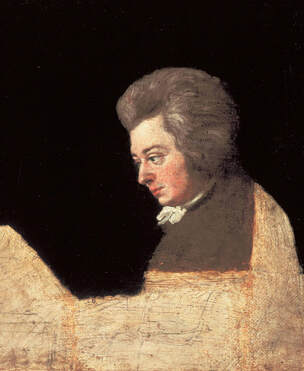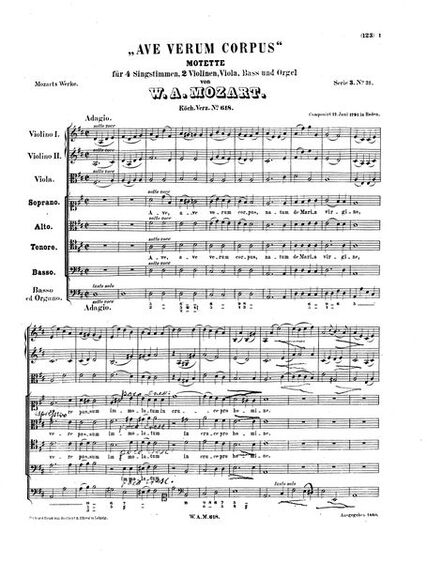 Mozart, c. 1782 - unfinished portrait by Joseph Lange. Mozart, c. 1782 - unfinished portrait by Joseph Lange. Trinity Sunday, June 4, 2023, a select choir will sing Mozart's "Ave verum corpus" during worship. But what is this piece, and what makes it appropriate for a worship service? It's good to have friends Anton Stoll was the organist at St. Stephen in Baden bei Wein. This was a small spa town in the 1790s, just outside of Vienna. Constanza Mozart often went to the spa for health treatments. As did her husband, Wolfgang Amadeus Mozart. over time, Mozart and Stoll became friends. In 1791 Constanza returned to the spa, and Mozart -- in the midst of writing "The Magic Flute" joined her. He reconnected with his friend Stoll, and decided to help him out. During his short stay Mozart tossed off a motet (sacred song). "Ave verum coprus" was a gift to Stoll. No biggie, just a little something extra for his friend to use during the upcoming Feast of Corpus Christi. The motet's since become a standard part of the choral repertoire.  First page of the score, It's from the 1880 Breitkopf & Hartel collection of the complete Works of Mozart. First page of the score, It's from the 1880 Breitkopf & Hartel collection of the complete Works of Mozart. Words have meaning -- especially Latin ones "Ave verum corpus" is a Latin liturgical text. It's been in use by the Roman Catholic Church since the 14th Century. It's sung during the serving of communion. The text translates: Hail, true Body, born of the Virgin Mary, truly suffered, sacrificed on the cross for mankind, from whose pierced side water and blood flowed: Be for us a foretaste of the Heavenly banquet in the trial of death! O sweet Jesus, O holy Jesus, O Jesus, son of Mary, have mercy on me. Amen. Why are we hearing this on Trinity Sunday? Mozart wrote the motet for the Feast of Corpus Christi service. The feast day entered the Roman Catholic Church's liturgical calendar in 1264, on the recommendation of Thomas Aquinas. "Corpus Christi" translates as the "Body of Christ." The service is a meditation on both the physical and spiritual aspects of Jesus -- the two parts of the body of Christ. These are represented in the elements of communion with the bread and the cup. Early Protestant churches celebrated the Feast of Corpus Christi. (Some denominations still do,) The feast day is the Thursday after Trinity Sunday. Since we don't celebrate this day, Trinity Sunday makes the most sense liturgically. What can I expect to hear? Mozart is unfailingly tuneful. So be careful -- you may find yourself humming along with the music. Mozart's setting of the text is quite straightforward. You won't hear any complex counterpoint as you would with Bach. And although the text is Medieval, it's setting is contemporary (to the 18th Century). So you'll hear cleary, transparent harmonies, mostly made up of simple chords. But of course, in Mozart, simplicity can be deceptive. He subtly colors the text, especially the last three lines. It's but one of the touches that rises this motet above the ordinary. - Ralph Graves OPC Communications Team Leader Program Director, CharlottesvilleClassical.org
0 Comments
Leave a Reply. |
Archives
April 2024
Categories
All
|
